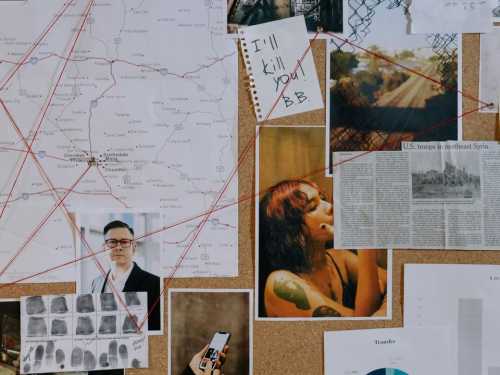
We bring to your attention five exciting thrillers in which you are unlikely to guess the outcome.
Thrillers with a surprise ending are a special kind of cinematic art, where directors play with the viewer's perception, forcing them to remain in suspense until the final shots.
Personally, for me, the most valuable thing about such thrillers is not just the shock of the denouement, but the active thinking process that they trigger. It's like a game with the director, where you try to outwit him, to find that one detail that everyone else missed. Often, when I watch such films with friends, we even take breaks to discuss our theories and predictions. And when the finale turns everything upside down, it's not just “wow”, but also a deep realization of how easily perception can be manipulated, how little we pay attention to the “minor” details that are actually the key. Try to approach watching these films not as a passive viewer, but as an amateur detective – it will enhance the impression many times over!
“The Girl on the Train”
Rachel Watson, who has lost both her job and her marriage, tries to cope with the emptiness with the help of alcohol and endless train trips. Every day from the window of the carriage she sees the familiar scenery: the house of her ex-husband Tom, his new wife Anna and neighbors – Scott and Megan Hipwell, whose life she imagines to be perfect. But somehow this illusion is destroyed: Rachel notices that Megan has a secret lover. Unable to stand it, the heroine decides to intervene and, getting off at the right station, express everything she thinks. The morning turns into a nightmare – Rachel comes to her senses in blood, not remembering anything, and soon learns that Megan has disappeared and was found dead.
Watching The Girl on the Train, I recalled my own moments when I was so tired or excited that events blurred in my memory, and then had to reconstruct the chronology in detail. This film does not simply play on the heroine's amnesia, it forces the viewer to question their own ability to distinguish between truth and fiction, as if the director is playing with our memories. This evokes a feeling of deep psychological discomfort, but at the same time, admiration for the mastery of the narrative.
“Zodiac” (Zodiac)
On July 4, 1969, a couple in love are gunned down on the outskirts of Vallejo, California. A paralyzing fear descends upon the town as a mysterious killer known as the Zodiac begins his bloody game, sending cryptic messages to newspapers and threatening to kill 12 more people unless the text of the letter, containing the secret of his identity, is published in the front page. The focus of the story shifts from the maniac himself to three people – cartoonist Robert Graysmith and two detectives – whose lives and careers are slowly consumed by the obsession to catch an elusive criminal who always seems to be two steps ahead.
When I first saw this film, I was struck not so much by the brutality of the murders as by the psychological pressure that the unknown exerted on the characters and, consequently, on me as a viewer. The Zodiac case remains one of the most famous unsolved cases in history. This film beautifully conveys the feeling of helplessness and frustration when all logical paths lead to a dead end. It makes you think about how real unsolved crimes affect society and those who try to find the truth, turning their lives into an endless search for an answer that may never come.
“Gone Girl”
Nick Dunne, a literature teacher, and his wife Amy are celebrating their fifth wedding anniversary. But the celebration turns into a tragedy: upon returning home, Nick discovers an empty house and traces of a struggle, and his wife has disappeared without a trace. Everything points to a kidnapping, and the story instantly becomes the property of the press. The reason is Amy herself: it was she who inspired her parents to write a series of popular books about “Super Amy” in her childhood – and her disappearance becomes a national sensation. Under the close attention of journalists and the police, Nick gradually turns from a loving husband into a prime suspect, and the marriage, which seemed perfect from the outside, begins to reveal itself from an unexpected side.
“Gone” is not just a detective story, it is an anatomy of modern relationships and manipulation, amplified by the influence of the media. When I watched this film, it made me think about how easily the external image can differ from the internal truth in any relationship. We often see “perfect” couples on social media, whose lives seem flawless, but what happens behind closed doors? This film is shocking in the way it exposes the dark side of the human psyche, jealousy and the desire for control, showing that the most terrible monsters can hide behind the sweetest smiles. It is a great reminder that you should never judge a book by its cover, especially when it comes to human relationships, and that each of us can have hidden, very complex sides.
“Prisoners”
In a quiet suburb on Thanksgiving Day, two little girls go missing. The only clue is a battered van seen on the street. When the police pull over a mentally challenged driver but can't find any evidence to arrest him, the father of one of the missing girls, an ordinary and calm man, is faced with a painful moral choice: how far will he go in his search for the truth if his child's life is at stake?
“Prisoners” is a film that makes you painfully test your own moral boundaries. After watching it, I thought for a long time about the question: “What would I do if I were a father?”. This is not just a story about kidnapping, it is a deep dive into the abyss of despair and instinctive reaction to a threat to the life of a child. The film masterfully shows how easily an ordinary person can cross the line of what is permissible when all other options are exhausted and the justice system seems powerless. Personally, for me, this was one of those rare films that does not give a clear answer to the question of the “rightness” or “wrongness” of actions, leaving the viewer in a state of moral dissonance. This is not just a thriller, but an emotional journey that makes us think about the nature of justice, revenge and parental love.
“Searching”
Single father David Kim has become accustomed to communicating with his daughter Margo via text and video chat. When she doesn't answer one evening, he panics and realizes that he doesn't know her friends or hobbies. His only clue is her laptop. In a desperate attempt to find any clues, David dives into his daughter's digital world, where every open window, every forgotten message, and every hidden folder opens the door to secrets he never knew existed.
“Search” is not only an innovative format, but also a wake-up call for everyone living in the digital age. When I watched this film, it gave me a strange feeling of “digital discomfort”, as if I was peeking into someone else's laptop. This film perfectly shows how illusory our “privacy” on the Internet can be and how many digital traces we leave behind that we don't even think about. Personally, after watching this film, I became more attentive to how children, or even ourselves, shape our online image, and how important it is not to lose real connection, even if communication takes place through screens. The film is a powerful reminder that behind all these messages, posts and likes, there are real people with their own secrets, and that sometimes the best way to find someone is to try to understand their digital world.
Джерело: ukr.media






